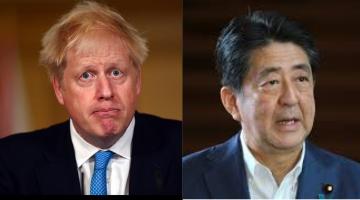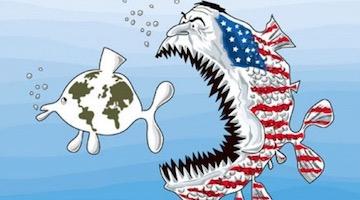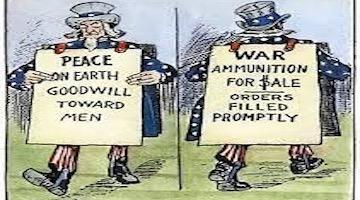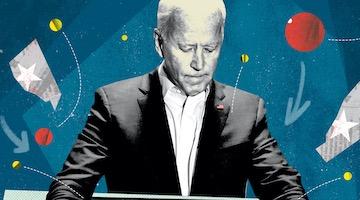“China’s rise, which is at the heart of the multipolar trend, is the primary threat to U.S. international supremacy.”
This week I spoke with Ajit Singh. Singh is a political analyst, writer, and lawyer. His work has appeared in progressive outlets such as Truthout, TeleSUR English, and the Monthly Review Online. Singh’s articles in these publications have centered on developments in and around China. We used this particular interview to give an overview of the most critical elements of China’s significance in the current political moment.
DH: Please give readers a brief description of who you are and what led you down your political path?
AS: I had progressive leanings growing up but for some time was stuck in a naive, liberal framework, thinking these problems simply required more awareness or empathy and electing the right leaders.
It wasn’t until I graduated from university that my political views began to fundamentally shift. Getting involved in struggles in my home city of Hamilton, Ontario against poverty, police brutality, racism, and war, was instrumental to my political development. It led to my realization that these and other issues are connected and cannot be addressed without struggling against capitalism and imperialism, and for socialism.
“I came to the view that China continues to be a socialist state and is progressive force in the world.”
I now identify as a Marxist and anti-imperialist. I began to focus on the People’s Republic of China to address my own lack of understanding about it. As I studied, I came to the view that China continues to be a socialist state and is progressive force in the world. My writing about China aims to provide accessible and timely analysis of the country to address the severe misunderstandings about China amongst Western leftists and progressives, and to combat the demonization which China is subjected to by U.S. and Western imperialism.
DH: Black Agenda Report is an extension of the Black Radical Tradition, which has historically been socialist or at least sympathetic to the system of socialism. Few in the West believe China is a socialist country. Why are they wrong?
AS: The dominant view in the West is that China is a capitalist and even imperialist state that plays a regressive role in the world. According to this view, China abandoned socialism for capitalism following economic reforms which were initiated forty years ago in 1978.
At that time, although living standards had significantly improved following the socialist revolution in 1949 — life expectancy nearly doubling in the first 30 years — China still faced tremendous challenges with a GDP per capita figure lower than that of India and 542 million people living on less than one dollar per day.
“The commanding heights of the economy remain under public ownership and the firm control of the socialist state.”
The party considered the principal contradiction in Chinese society to be between people’s needs and China’s severe economic underdevelopment. Seeking to overcome the country’s underdevelopment, the West’s monopoly over technology, and the isolation to which it had been subjected to during the Cold War by the United States, China implemented reforms in order to promote economic growth and development.
The reforms allow for a sphere of capitalist development, while the commanding heights of the economy remain under public ownership and the firm control of the socialist state. If these reforms had constituted the overthrow of socialism, one would expect to see the signs of a counter-revolution: dismantling of the socialist state, a significant reduction in Chinese living standards, and China’s subordination to imperialism. In Eastern Europe, capitalist counter-revolution led to the greatest population loss in modern history and increasing Western domination.
However, in China, living conditions have consistently improved and the country has grown increasingly strong. Since 1978, China has lifted 800 million people out poverty—more than the rest of the world combined—and real income for the bottom half of earners has grown 401 percent (compared to a decrease of 1 percent in the U.S.). China has generated “the fastest sustained expansion by a major economy in history,” according to the World Bank. China’s GDP growth has averaged nearly 10 percent a year over a 40-year period, without capitalism’s signature crises, and the country is becoming a world leader in science, technology and innovation. Rising from extreme poverty to international power, China now has the world’s second largest economy, and is generally expected to overtake the U.S. in GDP terms within the next two decades.
“Since 1978, China has lifted 800 million people out poverty—more than the rest of the world combined.”
China is also a global leader in environmental sustainability, leading the world in renewable energy production and employment. Greenpeace has praised China’s tremendous achievements in improving air quality in its “war against pollution”, which hasb reduced pollution in cities by an average of 32% in just four years according to a recent study by the University of Chicago.
It is clear that China stands in sharp contrast to the capitalist world, where climate destruction runs rampant and the majority of people’s livelihoods constantly face attacks. The qualitative difference between China and capitalist countries is precisely because China’s economy is not dominated by the capitalist need to maximize profit. This is especially apparent when China is compared to capitalist countries also in the global South.
China’s rise is central to a world multipolarisation trend, in which multiple centers of power are emerging to shape a more rules-based and democratic international order. China’s internationalism and respect for the self-determination of other countries has made it an indispensable partner for nations resisting foreign domination and pursuing independent development, including Cuba, Venezuela, Bolivia, Zimbabwe, Syria, Iran, and North Korea. In fact, Cuban revolutionary Fidel Castro declared in 2004 that “China has objectively become the most promising hope and the best example for all Third World countries … an important element of balance, progress and safeguard of world peace and stability.”
DH: Much of your political work has focused on debunking the imperialist narrative about China in the current period. One can find a number of articles in the corporate press describing China as anything from a capitalist disaster to an “authoritarian” communist nightmare. What are some of the narratives being peddled by the imperialist countries about China and why are they important?
AS: On a near daily basis, the corporate-owned media promotes hostility towards China with hawkish, sensationalized and dishonest reporting. There are three main narratives:
The Chinese state is a repressive “authoritarian” or “totalitarian” dictatorship that is in all respects regressive
China is an imperialist power that dominates other developing countries of the global South
China is a threat to ordinary, working people in the U.S. by “stealing jobs” and “stealing technology,” and is responsible for the economic problems the U.S. faces
“The qualitative difference between China and capitalist countries is precisely because China’s economy is not dominated by the capitalist need to maximize profit.”
These false narratives are promoted in an effort undermine solidarity with China and pave the way for the military and economic strategy of U.S. imperialism to contain and isolate China. The aims are to drive a wedge between developing countries and China, isolating China and also curtailing the right of developing countries to choose their partners and an independent path; instill fear and hostility amongst ordinary, working Americans towards China; and absolve the U.S. ruling class and capitalism of their responsibility for the country’s economic problems.
It is important to understand that U.S. hostility towards China is rooted in the foundation of modern U.S. foreign policy. Since the fall of the Soviet Union in 1991 and end of the Cold War, the U.S. has sought to establish unipolar global dominance and “prevent the re-emergence of a new rival” capable of challenging its aspirations. China’s rise, which is at the heart of the multipolar trend, is the primary threat to U.S. international supremacy. Washington seeks to launch a new Cold War against China in order to retain its dominance. This hostile bipartisan strategy is escalating under Trump, which I recently wrote about in depth here.
DH: China has announced a historic plan to build a “New Silk Road” called the Belt and Road Initiative. What is this project and why is it so significant?
AS: The Belt and Road Initiative is a massive, trillion-dollar development project initiated by China which has been called “the largest single infrastructure program in human history.” It involves over 70 countries and 1,700 development projects promoting connectivity, trade, cooperation and development between Asia, Africa, Latin America, and Europe with highways, railways, power plants, bridges, and communication grids.
It is China’s signature international policy in the current period. Beyond trade and development, the productive international relations that this project creates and promotes undermines U.S. imperialism’s strategy which is to isolate and contain China. It is laying the foundation for a post-Western dominated world.
DH: Russia has become the object of obsession for American imperialism. Russia has been blamed for Donald Trump's electoral victory and has become the scapegoat that justifies the internet suppression of Independent media outlets such as Black Agenda Report. What the corporate media rarely speaks about is how Russia has been more concerned with China than the US in recent years. Could you tell me a little about the growing Russia and China partnership and how it affects American imperialism?
AS: While pursuing different paths of development, China and Russia are united by their desires for independent development and the common threats they face from U.S. imperialism, including military encirclement, economic aggression, destabilization, and “regime change.” In the most recent National Defense Strategy, released in January, the U.S. explicitly stated that “inter-state strategic competition, not terrorism, is now the primary concern in U.S. national security” and named China and Russia as the principal “threats.”
“China and Russia’s strategic partnership is key to the multipolar trend which opens space for progressive and revolutionary advances around the world.”
For some time now, relations between China and Russia have been steadily improving and China recently stated that relations between two countries are at “the best level in history.” As U.S. hostility increases, there appears to be a concerted effort on the part of both countries to deepen their partnership. During a trip to Russia this month, China’s Defense Minister stated that he attended to “let the Americans know about the close ties between the armed forces of China and Russia.”
As the two strongest anti-systemic forces (meaning, in opposition to the project of U.S. imperialism) in the world, China and Russia’s strategic partnership is key to the multipolar trend which opens space for progressive and revolutionary advances around the world. It is crucial that U.S. and Western leftists have a clear understanding on this issue and reject the hostility and demonization which their political establishments demonstrate towards these countries.
In his recent book Russia and the Long Transition from Capitalism to Socialism, Egyptian Marxist Samir Amin puts it well:
“In the same way that capitalism first developed within feudalism before breaking out of it, the long transition of world capitalism to world socialism is defined by the internal conflict of all the societies in the system between the trends and forces of the reproduction of capitalistic relations and the (anti-systemic) trends and forces, whose logic has other aspirations—those, precisely, that can be defined as socialism.
“How to get out of capitalism and go beyond it remains the central question for the Russians, the Chinese, and all the other peoples of the world. If the thesis of the long transition that is sketched here is accepted, the immediate step is to deal with the challenge that confronts us all: building up a multipolar world that makes possible the maximum development of anti-systemic forces.”
DH: Jacobin Magazine, among other left-wing outlets and organizations, has taken hostile positions on China. Most recently, Chinese President Xi Jinping has been criticized for eliminating term limits for office. In your view, why does the American and Western left hold China in such contempt, and what should our analysis of China consider in revising such monumental errors in political thought and action?
AS: It is obvious that Western criticism directed towards China and Xi Jinping for the removal of term limits is politically motivated and not based on any substantive concern for “democracy.” I recently wrote about this issue here.
While Xi is called an “emperor” and “dictator” the same standard is not applied to Western countries and their allies, many of whom don’t have term limits for heads of state. Leaders of these countries are never described as “dictators” or “authoritarian” even when they remain in office for lengthy periods of time. In fact, German Chancellor Angela Merkel — who is beginning her fourth term and 13th year in office — is regularly described as “leader of the free world.” Even more striking is the media representation of the notoriously repressive Western-allied Saudi monarchy. Over the past year, Crown Prince Mohammed Bin Salman has regularly been praised in prominent Western corporate media outlets as a “revolutionary.”
“The logic is clear: if it's China, it's bad — the issues themselves are largely irrelevant.”
Western political establishments consider nearly everything China does to be nefarious, regressive or a “threat.” The corporate media response to the removal of presidential term limits is just the latest example. The logic is clear: if it's China, it's bad — the issues themselves are largely irrelevant. This hostility and bias is a reflection of the US and West's anxiety about China's rise and the challenge it poses to their long-held global dominance.
The majority of the Western left, including Jacobin Magazine, adopts the prejudices and chauvinism of their imperial ruling classes towards China (and nearly every state targeted by U.S. and Western imperialism). For example, a recent piece from Jacobin on China’s removal of term limits, titled “China’s One-Man Show,” is an interview with Isabel Hilton, appointed an Officer of the Order of the British Empire, and indistinguishable from the coverage we’ve seen in the corporate press. Whatever you think about China, it’s clear that the such an engagement with the country is not serious, thoughtful, or progressive.
It is telling that China is overwhelmingly praised by developing, formerly colonized countries of the South — most enthusiastically by those with progressive or revolutionary leaderships — but vilified by the majority of the left in imperialist countries. The Western left should reflect seriously on that fact.
First and foremost, the priority of the Western left is to defend countries, like China, which are targets for the imperialist aggression of their own governments, and to promote peaceful and respectful relations. It is not the job of the Western left to tell these countries how to conduct their own affairs — the Western left should work to provide these countries space to conduct their own struggles. The Western left should be self-critical of their history and tendency of paternalism, idealism and chauvinism towards targets of imperialism.
DH: What projects are you involved with now and where can we find your work? And if readers want to know more about China, what are some reliable sources to investigate?
AS: I’m involved in a few writing and alternative media projects at the moment. The best way to find my work is via Twitter @ajitbirsingh.
Some writers and scholars whose work is available in English that I’d recommend, include:
Jude Woodward (“The US Vs China: Asia's New Cold War?”)
Jenny Clegg (“China's Global Strategy: Towards a Multipolar World”)
Domenico Losurdo (“Has China Turned to Capitalism?—Reflections on the Transition from Capitalism to Socialism”; “Class Struggle: A Political and Philosophical History”)
Giovanni Arrighi (“Adam Smith in Beijing: Lineages of the Twenty-first Century”)
Samir Amin
Abayomi Azikiwe
John Ross
Roland Boer
Patrick Lawrence
Deborah Brautigam (“The Dragon's Gift: The Real Story of China in Africa”)
I’ve also put together this reading guide on China.
Danny Haiphong is an activist and journalist in the New York City area. He can be reached at wakeupriseup1990@gmail.com



















